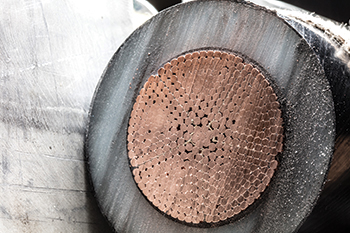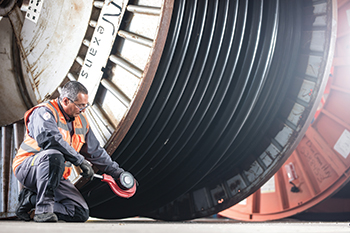Nexans is paced for growth in the Mideast
01 August 2018
Nexans Group, a leader in advanced cabling and connectivity solutions headquartered in France, has drawn up a meticulously planned strategy – ‘Paced For Growth’ –that is aimed at increasing its global footprint, including in the Gulf region.
This recently unveiled 2018–2022 strategic plan focuses on tackling tomorrow’s challenges and embarking on innovation as a tool for product differentiation on a global scale, including the region.
Youssef Goughbar, Nexans GCC sales and marketing director, tells Abdulaziz Khattak of Gulf Construction: “The plan addresses the trends we see in the sector and is anchored around Nexans’ global industrial footprint, which spreads across 34 countries and includes over 90 factories – including three in the Middle East – manufacturing all types of cabling solutions; research and development (R&D), technology, engineering and knowledge (TEK) centres.”
‘Paced For Growth’ aims to position Nexans as the leader for advanced cabling and conductivity solutions, Youssef points out. This strategy is built around seven industrial and socioeconomic trends identified by Nexans, such as energy transition, data exchange and transmission, as well as eco mobility, which will inevitably impact its customers and provide the group with growth opportunities. The company expects that some of these trends, such as the growing urbanisation and smart infrastructures, will be particularly strong in the Middle East.
The Paris-headquartered group has been operating in the Middle East for more than 30 years and its core business in scale and global reach has been cables and services for building and territories, infrastructure, including interconnections and submarine cable systems, oil and gas, power generation, and railway markets.
Nexans focuses on continuous innovation in products, solutions and services, employee development, customer training and the introduction of safe, low-environmental-impact industrial processes.
The company supports its customers with a full range of manufactured cables to customised cabling solutions, including low-, medium-, high- and extra-high (400 kV and above) voltage, with cable sizes ranging from 0.145 mm in diameter up to 2,500 sq mm.
Its products are manufactured using competitive first-class raw materials and suppliers to meet projects’ specifications. To do so, Nexans uses an impressive worldwide internal and external supply chain to support its factories across five continents, says Youssef.
Nexans empowers its customers in four main business areas:
- Building and territories, including utilities, smart grids and emobility;
- Telecom and data, covering data transmission, telecom networks, hyperscale data centres, and LAN; and
- Industry and solutions, including renewables, transportation, oil and gas, and auto-mation; and
- High voltage and projects, covering offshore wind farms, submarine interconnec-tions, and land high voltage.
Elaborating on these business areas, Youssef says: “In the building and territories segment, Nexans pursues a strategy of bringing more value to our customers through technical performance, sustainability and added-value services.
“In the telecom and data segment, we manufacture submarine telecommunications cables, copper-based networks and fibre-to-the-home systems as well as telecom solutions and solutions for hyperscale data centres.
“In the industry and solution segment, Nexans’ key areas of focus include automation, renewables and wind OEMs (original equipment manufacturers), aerospace, rail and rolling stock as well as the oil and gas industry.
“And in the high voltage and projects market, Nexans’ knowhow includes network interconnections between countries, offshore wind farm connections, island-to-mainland links as well as high-voltage, direct current (HVDC) interconnections, superconducting cables and fault current limiters and composite core cables for overhead lines.”
As a leading global supplier of cables for submarine applications, Nexans also designs hybrid and umbilical cables to power and control installations as well as direct electrical heating (DEH) systems used to maintain flow in submarine pipelines.
 |
|
A high-voltage cable by Nexans ... cable sizes ranging from 0.145 to 2,500-sq-mm diameter are produced. |
Research & Development
Nexans’ factories have full design, engineering and manufacturing capabilities and are supported by an impressive network of four specialised R&D and 11 TEK centres across Europe, US and Asia.
Nexans’ four dedicated research centres include those for the metal and metallurgy process group in Lens, and for polymers and advanced technologies in Lyon, both in France; the extrusion process group in Nuremberg, Germany; and a polymers research centre in Juncheon, South Korea.
The 11 TEK centres for different industries are located in France, Germany, Belgium, Norway, the US, and South Korea.
Goughbar says Nexans has acquired extensive experience and expertise through continuous R&D investments, which comes from a pool of 900 researchers, engineers and technicians and Nexans’ 600 registered patents (including registering more than 50 patents in 2017 alone).
“In 2017, Nexans invested €102 million ($118.7 million) in R&D, and focused on cutting-edge technologies to offer competitive, high-quality products and services to support customers in solving their most complex challenges.”
Thanks to its continuous R&D efforts, every year Nexans is able to address new market requirements with innovative products. For example, today, Nexans is able to support the region by providing 132 kV cables from its regional factories in the Middle East.
Regional Focus
Nexans has a strong local presence in all regions, including the Gulf, allowing it to meet the needs of its customers across the world. The group is present in 13 countries within the Middle East, Russia and Africa (Mera) region – including in the UAE, Saudi Arabia, Kuwait, Qatar, Lebanon, Morocco and Turkey, with more than 3,500 team members. It has manufacturing facilities in Lebanon, Qatar, Morocco, and Turkey.
Goughbar says the company is capable of mobilising various plants, including those plants in Lebanon, Qatar, Korea, Turkey, France, and the US, to supply cables to the Middle East.
“In the coming years, our team has ambitions plans to further expand our regional presence with a particular focus on oil and gas, railway, power generation including renewables and infrastructure,” he says.
Nexans has supplied several important projects in the Gulf and the wider Middle East where it has delivered and installed cables including for the Riyadh Metro in Saudi Arabia and Al Zour Refinery in Kuwait (both of which are yet to be commissioned). Another key project is the Nasr 2 oilfield development in Abu Dhabi, UAE, where Nexans has delivered and installed 3,000 km of power and instrumentation cables, in addition to subsea cables.
Currently, it is supplying Hypron instrumentation cables and fibre optic cables to the Liwa Plastics project in Oman.
Commenting on business in the region, Goughbar says despite the regional market conditions on account of the low oil prices and their impact on key oil and gas infrastructure projects, Nexans has been able to maintain a healthy level of business in the region.
Standards & sustainability
As an active member of many international standardisation bodies (Europacable, Cigre, Nema, and International Cablemakers Federation), Nexans actively participates in developing standards for a safer and more efficient tomorrow. In addition to traditional certifications such as ISO 9001 and 14001, Nexans can meet most international industry-specific standards and specifications in the oil and gas, power generation or railway sectors, to name few.
According to Goughbar, the company is committed to sustainable development. “In addition to the ISO 14001 certification, we have developed an even stricter internal Environment Highly Protected (EHP) label,” he says.
Globally, Nexans employs close to 26,000 people and in 2017 generated sales of €6.3 billion ($7.34 billion).
- UAE power cables market to reach $2.5bn
- Ducab’s diverse range of power-packed performers
- Prysmian line goes ultra-compact
- Nexans is paced for growth in the Mideast



